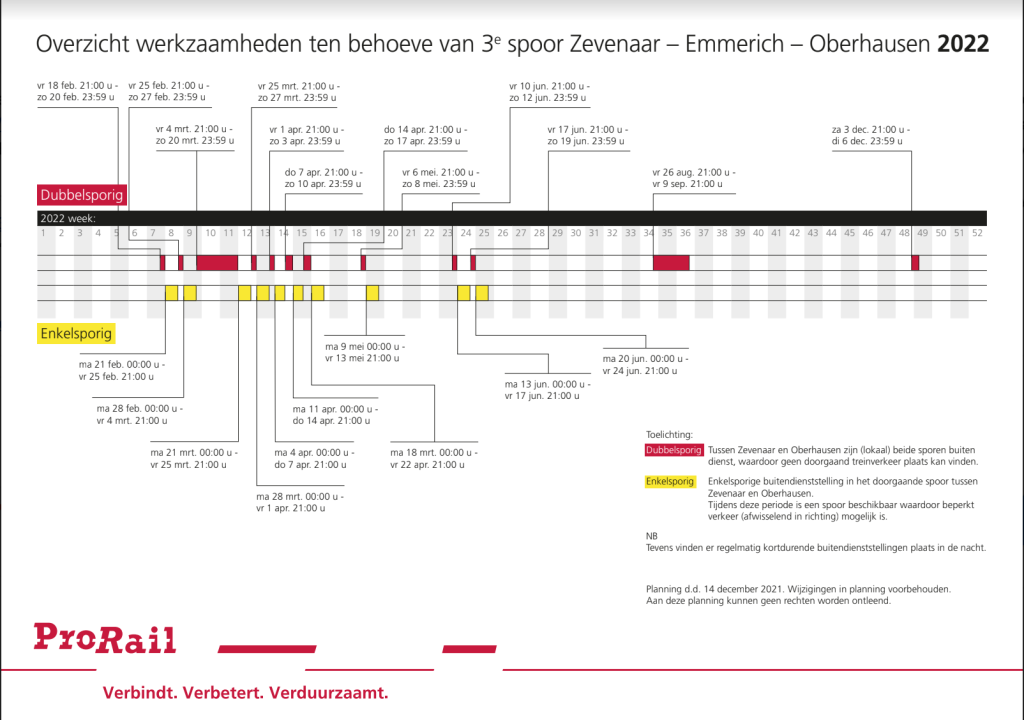DB Netze: severe restrictions due to construction works 11/04/22
< Zurück
For the next three weeks there will be severe restrictions on the German part of the Rhine-Alpine corridor. Two sections will have limited capacity due to construction works, and this coincides with the already ongoing works on the Third track, between Germany and the Netherlands. Operators are gearing up for another turbulent month for rail freight.
On Friday 8 April construction works started on the ‘Right Rheinstrecke’ between Cologne and Koblenz. Up until 15 April, capacity will be restricted to a single train path, or no available train paths, which will alternate.
Starting this Friday 15 April, construction work will take place on various sections of the route between Basel and Rastatt, resulting in single-track and at times total closures as well. This will last until 25 April. “According to DB Netze, regular traffic will need to be thinned out, and there is likely no train path available for short-term traffic.
Third Track works
The construction works coincide with the works on the Emmerich – Oberhausen section, or the Third track. Train traffic between the Netherlands and Germany partly uses other border crossings. This work will run until 22 Friday and results in a total closure of the track section, alternating with single-track train traffic.
Due to this timing, the construction works are expected to have a large impact on rail freight traffic on the Rhine-Alpine corridor. Hupac said that it expects a cancellation rate of 40 per cent of its traffic. In other media, DB Cargo is reported speaking of 280 cancellations, while detouring a quarter of its planned departures.
“We ask you to take the infrastructure restrictions into account when planning and coordinating your flexible transport and to inform us in good time about canceled trains so that the available capacities can be used optimally”, DB Netze says.
Repetition of the same?
In the last few months of last year, a similar situation took place. Construction works took place in the Rhine Valley, coincided with construction works on the Third Track and led to several weeks of limited capacity. The impact on the industry was felt well into the new year.
The impact is large because the route is the most-heavily consumed in Europe. The Rhine Alpine corridor connects the sea ports of Western Europe with Switzerland and Italy, and Germany covers a large part of it. Any temporary or partial closure will inevitably impact international rail freight traffic.
But this is not enough as an explanation. The need for sufficient alternatives have been pointed out many times and by many different players. Trains can be rerouted, but the alternatives do not provide the capacity required. There are freight limitations on the route through France, and there is a lack of train drivers familiar with the route. This became painfully evident during the Rastatt incident in 2017, and still does not seem to have been resolved.
No better timing
According to Phillip Hanze from the Rhine-Alpine corridor there is no right timing of construction work. “This could not have been done at a better time, as there will be construction works between Germany and Belgium next month. In the next two years, a lot of construction works will take place on the German network, and this just needs to be done.”
However, there are talks being held between the German and French infrastructure managers to increase the availability of the alternative route through France. “In 2024, there will be a long-time closure of the railway line in Rastatt, and this will have a big impact. There are working groups in place discussing the diversion routes, and this should result in an improved route through France”, Hanze explains.
Importance of the work
Apart from the works on the Rhine Valley, the works on the Third Track will continue to have an impact. A planning document shared by DB Cargo the Netherlands shows that the period of March-April has a high density of works, but more is to come in June and August.
The Third Track is an additional border crossing extending the freight dedicated Betuweroute from the Netherlands into Germany. “The number of trains using the Betuweroute has grown in recent years and is expected to increase further. For example through the new terminals on Maasvlakte 2. In order to manage the expected increase in the right direction, more capacity is needed at the border in Zevenaar and in Germany. The construction of the third track will enable carriers to deploy more freight trains in the future on the European freight transport corridors, such as between Rotterdam and Genoa”, the operator explained.
 Planning of works on the Third Track
Planning of works on the Third Track
Reduced performance quality
This being said, European operators often explain that construction works are very little coordinated with neighbouring infrastructure managers. Works are regularly planned in Germany at the same time as major line closures in the Netherlands, for example. This leads to an increasing frustration throughout the sector. “We do understand that construction works need to be carried out, but our customer do not. More and more cargo is shifted to the roads”, commented Mark Jansen from Hupac.
During the capacity crunch in December, Jan Weiser from Kombiverkehr explained: “There are also restrictions and bottlenecks in train drivers, locomotives and wagons, partly due to corona, which leads to severe train delays and an overall situation that is still very difficult to plan. The railway undertakings see the increased construction activities in the German and European rail network as a major cause for the current performance quality.”





